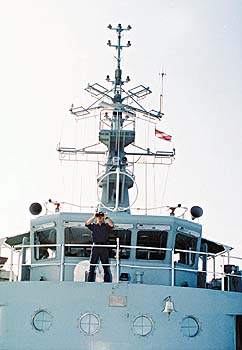Radar emissions within safe limits
 On watch: Marine officers were consulted for the on-board emissions tests |
Radar and radio emissions from police launches do not exceed stringent exposure limits, tests have found.
Experts from Information Systems Wing and the Office of the Telecommunications Authority (OFTA) conducted tests from November to January and found levels did not exceed the stringent general public exposure limit specified by the International Commission on Non-ionising Radiation Protection (ICNIR).
The tests were conducted after fears were raised Marine officers had a higher incidence of cancer than the general public, possibly due to excessive levels of radiation emitted by launch communications and navigation equipment.
It was the third time such claims were refuted. Medical and engineering experts were consulted in 1992 after concerns were first raised, and concluded they were unfounded. In 1994, experts from the British Royal Navy also found no evidence of emissions posing a health hazard.
Marine Regional Commander Foo Tsun-kong said of the latest tests: "I am very pleased with the results as they will help alleviate concerns of officers. The highest levels recorded were well within general public safe limits and we hope officers will be reassured."
The study measured the levels of non-ionising radio frequency radiation on eight models of police launch in a number of scenarios, including worst cases.
Experts used two types of radiation meters for the test due to the wide variety of radio installations on the launches, and measurement points on the vessels were selected in consultation with Marine officers. The results showed the worst-case radiation levels were within ICNIR requirements, even under the strident general public limits which were lower than the occupational threshold.
Assistant Commissioner of Police (IS) Peter Halliday said the findings were significant due to the thoroughness of the tests. "We take health and safety issues in the workplace very seriously indeed. The Force, I consider, has a generally excellent record in this area and I am very pleased with OFTA's tests."
Project officer for the study, Marine Senior Superintendent (Support) Michael Parker said despite the reassuring result of the OFTA survey, it was only part of the research being done into the issue.
"The Department of Health is conducting research to see whether the cancer incidence of Marine officers is actually higher than the general public and is also looking at previous creditable international studies on the effects of radar radiation on people.
"We have submitted 30 cases of officers with cancer to the department for study, and information on these will come in due course. We are also examining internally to ensure we comply with the OFTA Code of Practice on the Protection of Workers and the Public against Non-ionising Radiation Hazards from Radio-transmitting Equipment. "
"This entire project is being done in an open and transparent manner which is why we are releasing the OFTA results now rather than waiting for the results of everything else to come in too. We want our officers to know what we know.
"The Department of Health research is very in-depth and will require more time," Mr Parker said.
The study was ordered by the Commissioner of Police after a top-level meeting on November 5. About 80 Marine officers then attended two ad hoc seminars on November 23 in which medical staff from the Department of Health briefed a cross-section of officers in Marine Region, including Junior Police Officers' Association and welfare representatives.
The brief comprised of the health aspects of radar exposure and the results of previous studies, as well as an update on the Department's initiatives in this area.